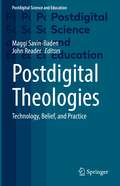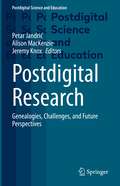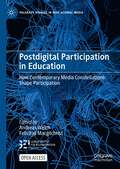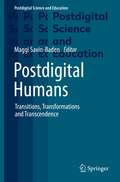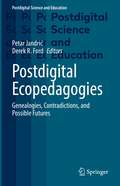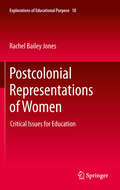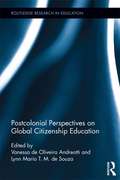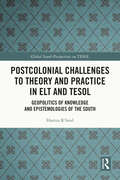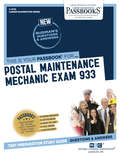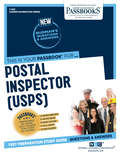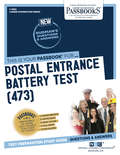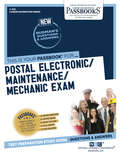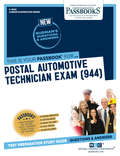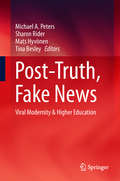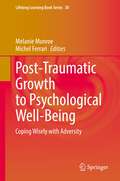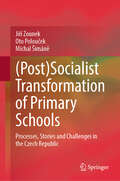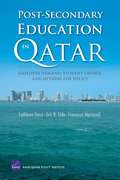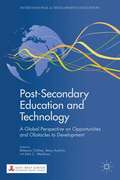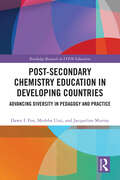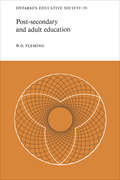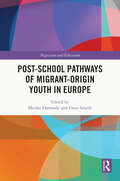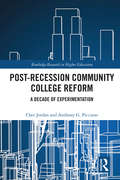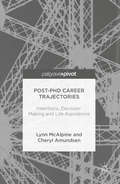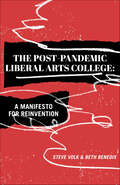- Table View
- List View
Postdigital Theologies: Technology, Belief, and Practice (Postdigital Science and Education)
by Maggi Savin-Baden John ReaderThis book is about the relationships between technologies and the content of religious belief and practice. A number of models are now starting to emerge, but each of these depends on the theological or philosophical framework within which the debate is set. At at the same time, there are dilemmas operating at different ends of the spectrum. For example, at one end there is a tendency towards subsuming the digital within the divine, and at the other an instrumental stance relating to how technology is deployed. Either of these stances could be said to ignore rather than acknowledge that the human itself is being changed as a result of the interactions with the digital. The book explores the following areas: · Where is God to be found or present in the postdigital condition? · What are the implications of the postdigital condition for spirituality and indeed for the activity of God through the Holy Spirit? · How do concepts of transhumanism or posthumanism effect understandings of the incarnation? · Does the doctrine of the Trinity need revisiting in the light of the digital as medium of relationship? · Does Creation now include the postdigital? · What of the Kingdom of God now that the kingdom of the Tech giants is so powerful all-consuming?
Postdigital Research: Genealogies, Challenges, and Future Perspectives (Postdigital Science and Education)
by Petar Jandrić Alison MacKenzie Jeremy KnoxThis book explores genealogies and the challenges related to the concept of the postdigital, the ambiguous nature of postdigital knowledges, and the many faces of postdigital sensibilities. The book answers three key questions: What is postdigital knowledge? What does it mean to do postdigital research? What, if anything, is distinct from research conducted in other perspectives? As such, this book is a one-stop publication for those interested in the theory of postdigital research. Postdigital Research: Genealogies, Challenges, and Future Perspectives is complemented by Constructing Postdigital Research: Method and Emancipation, also edited by Petar Jandrić, Alison MacKenzie, and Jeremy Knox, which explores these questions in practice.
Postdigital Participation in Education: How Contemporary Media Constellations Shape Participation (Palgrave Studies in Educational Media)
by Andreas Weich Felicitas MacgilchristThis open access book examines the interrelations and correlations of the postdigital condition and its relationship to education, with a particular focus on participation. Contributions reflect on how educational institutions are affected by the recent transformations of media technologies and practices, and how at the same time institutions such as schools and universities are supposed to enable people to participate in media practices in an informed and reflective way. How, and under what conditions, can teachers and students participate in contemporary media constellations? The book will be of interest to academics and researchers involved in teacher education, digital pedagogy, educational technology, instructional design, education philosophy and media education.
Postdigital Humans: Transitions, Transformations and Transcendence (Postdigital Science and Education)
by Maggi Savin-BadenThis book explores approaches to developing and using postdigital humans and the impact they are having on a postdigital world. It presents current research and practices at a time when education is changing rapidly with digital, technological advances. In particular, it outlines the major challenges faced by today’s employers, developers, teachers, researchers, priests and philosophers. The book examines conceptions of postdigital humans and studies the issue in connection with ethics and employment, as well as from perspectives such as philosophy and religion.
Postdigital Ecopedagogies: Genealogies, Contradictions, and Possible Futures (Postdigital Science and Education)
by Petar Jandrić Derek R. FordThis book conceptualizes ecopedagogies as forms of educational innovation and critique that emerge from, negotiate, debate, produce, resist, and/or overcome the shifting and expansive postdigital ecosystems of humans, machines, nonhuman animals, objects, stuff, and other forms of matter. Contemporary postdigital ecosystems are determined by a range of new bioinformational reconfigurations in areas including capitalism, imperialism, settler-colonialism, and ontological hierarchies more generally. Postdigital ecopedagogies name a condition, a question, and a call for experimentation to link pedagogical research and practice to challenges of our moment. They pose living, breathing, expanding, contracting, fluid, and spatial conditions and questions of our non-chronological present. This book presents analyses of that present from a wide spectrum of disciplines, including but not limited to education studies, philosophy, politics, sociology, arts, and architecture.
Postcolonial Representations of Women: Critical Issues for Education
by Rachel Bailey JonesIn this accessible combination of post-colonial theory, feminism and pedagogy, the author advocates using subversive and contemporary artistic representations of women to remodel traditional stereotypes in education. It is in this key sector that values and norms are molded and prejudice kept at bay, yet the legacy of colonialism continues to pervade official education received in classrooms as well as 'unofficial' education ingested via popular culture and the media. The result is a variety of distorted images of women and gender in which women appear as two-dimensional stereotypes. The text analyzes both current and historical colonial representations of women in a pedagogical context. In doing so, it seeks to recast our conception of what 'difference' is, challenging historical, patriarchal gender relations with their stereotypical representations that continue to marginalize minority populations in the first world and billions of women elsewhere. These distorted images, the book argues, can be subverted using the semiology provided by postcolonialism and transnational feminism and the work of contemporary artists who rethink and recontextualize the visual codes of colonialism. These resistive images, created by women who challenge and subvert patriarchal modes of representation, can be used to create educational environments that provide an alternative view of women of non-western origin.
Postcolonial Perspectives on Global Citizenship Education (Routledge Research in Education)
by Vanessa de Oliveira Andreotti Lynn Mario T. M. de SouzaThis volume bridges the gap between contemporary theoretical debates and educational policies and practices. It applies postcolonial theory as a framework of analysis that attempts to engage with and go beyond essentialism, ethno- and euro-centrisms through a critical examination of contemporary case studies and conceptual issues. From a transdisciplinary and post-colonial perspective, this book offers critiques of notions of development, progress, humanism, culture, representation, identity, and education. It also examines the implications of these critiques in terms of pedagogical approaches, social relations and possible future interventions.
Postcolonial Challenges to Theory and Practice in ELT and TESOL: Geopolitics of Knowledge and Epistemologies of the South (Global South Perspectives on TESOL)
by Hamza R'boulDrawing on the underrepresentation of the Global South in global knowledge production with a focus on the existing inequalities, the book highlights the importance of postcolonial narratives in Global Southern epistemologies in ELT and TESOL. Chapters consider the epistemological landscapes of these fields, their dedication to English teaching and English-related topics, and the intersection of the coloniality of language and the supremacy of English worldwide. The book explores the type of discussion that is needed to advance a more nuanced understanding of sociopolitical circumstances and how they shape our academic practices and theorizations of ELT and TESOL. In doing so, chapters examine the current geopolitics of knowledge that is found in journal publishing, citing how it favours the Global North, and further exploring ways of decolonizing language practices, teaching approaches and research cultures. Calling for greater visibility and recognition of Southern ways of knowing within ELT and TESOL practice and research, the book will be essential reading for scholars, researchers and students of TESOL, ELT, applied linguistics and multilingualism.
Postal Maintenance Mechanic Exam 933: Passbooks Study Guide (Career Examination Series)
by National Learning CorporationThe Postal Maintenance Mechanic Exam 933 Passbook® prepares you for your test by allowing you to take practice exams in the subjects you need to study. It provides hundreds of questions and answers in the areas that will likely be covered on your upcoming exam, including but not limited to: mathematics; electricity and electronics; tools and equipment; workplace safety; understanding and interpreting written and technical material; and more.
Postal Inspector: Passbooks Study Guide (Career Examination Series)
by National Learning CorporationThe Postal Inspector (U.S.P.S.) Passbook® prepares you for your test by allowing you to take practice exams in the subjects you need to study. It provides hundreds of questions and answers in the areas that will likely be covered on your upcoming exam.
Postal Entrance Battery Test: Passbooks Study Guide (Career Examination Series #C-3660)
by National Learning CorporationThe Postal Entrance Battery Test (473) Passbook® prepares you for your test by allowing you to take practice exams in the subjects you need to study. It provides hundreds of questions and answers in the areas that will likely be covered on your upcoming exam, including but not limited to: address checking; coding; name and number comparisons; understanding tabular material; and more.
Postal Electronic/Maintenance/Mechanic Examination: Passbooks Study Guide (Career Examination Series)
by National Learning CorporationThe Postal Electronic/Maintenance/Mechanic Examination Passbook® prepares you for your test by allowing you to take practice exams in the subjects you need to study. It provides hundreds of questions and answers in the areas that will likely be covered on your upcoming exam, including but not limited to: arithmetical reasoning; abstract reasoning; understanding and interpreting written material; tools both hand held and electrical; electronic equipment; safety; computer systems; ability to read and use technical drawings; mechanical comprehension; and other related areas.
Postal Automotive Technician Exam: Passbooks Study Guide (Career Examination Series)
by National Learning CorporationThe Postal Automotive Technician Exam (944) Passbook® prepares you for your test by allowing you to take practice exams in the subjects you need to study. It provides hundreds of questions and answers in the areas that will likely be covered on your upcoming exam, including but not limited to: troubleshooting and diagnosing vehicle problems; tools and equipment; and more.
Post-Truth, Fake News: Viral Modernity And Higher Education
by Tina Besley Mats Hyvönen Sharon Rider Michael A. PetersThis edited collection brings together international authors to discuss the meaning and purpose of higher education in a “post-truth” world. The editors and authors argue that notions such as “fact” and “evidence” in a post-truth era must be understood not only politically, but also socially and epistemically. The essays philosophically examine the post-truth environment and its impact on education with respect to our most basic ideas of what universities, research and education are or should be. The book brings together authors working in Australia, China, Croatia, Romania, Canada, New Zealand, Portugal, Sweden, UK and USA.
Post-Traumatic Growth to Psychological Well-Being: Coping Wisely with Adversity (Lifelong Learning Book Series #30)
by Melanie Munroe Michel FerrariThis book explores 'why some people experience post-traumatic growth leading to greater wisdom and others do not’ and suggests that a critical variable is how one copes with that trauma: individuals who actively reflect on their experiences of trauma should develop higher levels of self-transcendent wisdom. This same dynamic has been shown both in research studies of post-traumatic growth and by therapists working with people who have experienced trauma, but these two bodies of work have rarely been brought into direct conversation with each other. In this volume, wisdom researchers and therapists with direct experience with trauma survivors comment on each other’s ideas about how coping with adversity can lead to wisdom, and how their proposed models of developing wisdom incorporate the act of coping with a stressful or traumatic event. Based on a synthetic integration of the recommendations in each chapter, the book concludes with the introduction of a new conceptual framework that can better help even individuals who experience significant stressors in their life to cope well and develop wisdom that will be both theoretically robust and practically useful.
(Post)Socialist Transformation of Primary Schools: Processes, Stories and Challenges in the Czech Republic
by Jiří Zounek Oto Polouček Michal ŠimáněThis book addresses the transformation of primary education in the former Czechoslovakia (now the Czech Republic) after the fall of the communist regime in 1989. It follows the overall transformation of education and school policy and offers original insights into the everyday life of the schools at that time. It also provides a unique perspective on the whole transformation process. The work discusses the school environment in the context of specific local characteristics, such as parents, community, regional institutions, and national and international contexts. The book specifically focuses on the changes in primary school management in terms of economics, organization, and personnel. The processes of pedagogical change are an essential theme of the book. They cover how teachers proceeded through the changes in their work at the time of the transformation and the reasons for their resistance to change, including the challenges that the transformation introduced into their work and personal lives. The book also monitors how the teachers navigated the selection and use of new textbooks and tools, such as digital tools. The work originates in historical-pedagogical research, based primarily on the oral history method and complemented by the study of contemporary documents.
Post-Secondary Education in Qatar: Employer Demand, Student Choice, and Options for Policy
by Cathleen Stasz Eric R. Eide Charles A. Goldman Louay Constant Paco MartorellThe government of Qatar has made significant investments in post-secondary education to ensure that Qataris are able to contribute to the country's social and economic goals. The authors describe RAND's analysis of occupational demand and related post-secondary educational opportunities, and offer recommendations for improving the country's current provision of post-secondary education.
Post-Secondary Education and Technology
by Rebecca Clothey Stacy Austin-Li John C. WeidmanAs the global commitment to educational access has become enshrined in all levels of society, new technologies have also been developed that hold tremendous promise for enabling these goals. This book looks at trends and challenges for expanding access to post-secondary education via technology through a set of case studies and analyses.
Post-Secondary Chemistry Education in Developing Countries: Advancing Diversity in Pedagogy and Practice (Routledge Research in STEM Education)
by Dawn I. Fox Medeba Uzzi Jacqueline MurrayThis book considers how post-secondary chemistry education can be advanced in developing countries, in order to respond to emerging global, regional, and local needs.Taking Guyana as a case study, it pays particular attention to local challenges facing such territories, including human and financial resource shortages, tension between quality and quantity of graduates, cultural inequalities, unequal access to increasingly important Information and Communication Technology or Technologies (ICTs), and increasing competition from international universities in the developed world. Written by a team with over 70 years in combined teaching experience, it asks whether these challenges can be met and overcome and considers how tertiary chemistry education can better meet the rapidly changing needs of society. The authors examine the status quo of tertiary chemistry education in Guyana against the introductory backdrop of the internal and external stresses on the education system, before exploring selected best practices grounded in a three-pronged model focused on pedagogy, programming, and people. Advancing diversity on each of these levels, the book ultimately shows how this framework can support better learning and teaching, and the development of a better equipped and more diverse Science, Technology, Engineering and Mathematics (STEM) workforce.It will appeal to scholars, researchers, graduate students, and tertiary level curriculum developers in chemistry education, interested in an innovative, holistic approach for transforming chemistry teaching that focuses on pedagogical diversity, strategic co-curricular programming, and accommodating diversity and diverse learning styles in the classroom.
Post-secondary and Adult Education: Ontario's Educative Society, Volume IV
by W. G. FlemingPost-secondary education is one of the fastest growing segments of the educational system. In this volume the development and activities of universities, colleges of applied arts and technology, and other institutions of post-secondary education are described in detail. The public and private training activities of business and industry are outlined, and government programs for adult retraining described. Dr Fleming traces the origins of the institutes of technology and the college of applied art and technology, and he provides capsule histories of every university in Ontario.
Post-school Pathways of Migrant-Origin Youth in Europe (Migration and Education)
by Emer SmythThis volume explores the role of structure and agency in shaping post-school pathways for migrant-origin young people, providing new insights from countries with different migration histories and transition systems. The book collates the work of leading international scholars to cover a number of jurisdictions across Europe, looking in depth at migrant transitions in different contexts. The chapters examine the influence of different education systems, migration status, race and ethnicity, social class, gender and resilience on the success of transitions to higher education and the labour market. The book highlights the need for host countries to put in place comprehensive policies to counter ethnic inequalities and discrimination in their education and labour market systems while facilitating and supporting immigrant youth in pursuing their post-school pathways. This timely book will be of great interest to scholars, researchers and postgraduate students in the fields of migration studies, sociology of education and equity in education. Policy makers will find this book useful in informing policy development in education and the labour market.
Post-School Education (Routledge Revivals)
by Michael D. Stephens Gordon W RoderickFirst published in 1984, Post-School Education attempts to compare development of post-school education in America and England in nineteenth century. Divided into eight chapters, it discusses themes like traditions and attitudes; systems of school education; middle class initiatives prior to 1850; educational provision for adults in the 19th century; the growth of technical education; the development of university education; and the role of government, to showcase the extent to which England influenced America and differences between the two experiences. This book is an essential read for scholars and researchers of history of education, American education, British education and education in general.
Post-Recession Community College Reform: A Decade of Experimentation (Routledge Research in Higher Education)
by Chet Jordan Anthony PiccianoThe book analyses and evaluates several key community college reform programs that emerged after the Recession of 2008 and as a result of major initiatives in California, New York, Tennessee, Florida, Connecticut and Wisconsin. Because of the economic downturn in the early 21st Century, an already eroding financial base for public higher education saw even further losses. At the same time, enrollments were booming, particularly in the two-year sector where many students who would have traditionally forgone a college education, were now enrolling to ensure their competitiveness in a harsh labor market. Chapters in this book examine the development and implementation of initiatives and accountability measures imposed across the states by the Obama administration, and consider their effectiveness in reducing the impact of the loss of students, and their role in improving courses. This book will be of interest to postgraduates and researchers exploring the history of education in the United States, as well as academic administrators, faculty, and policy-makers with an interest in reform-based practices that have been successfully implemented in community colleges.
Post-PhD Career Trajectories
by Cheryl Amundsen Lynn McalpineThis book argues that post-PhD career planning should ideally begin at the same time as the PhD itself. Drawing from ten years of research and stories of close to 50 individuals, each chapter focuses on the stories of individuals who share common career intentions and how they negotiate these both before, during and after their studies. Each career trajectory is different as individuals planned and made decisions in the face of both expected and unexpected work, personal experiences and responsibilities. The book concludes with resources to help those who are currently planning or reflecting on their own career trajectories.
The Post-Pandemic Liberal Arts College: A Manifesto for Reinvention
by Steve Volk Beth BenedixA succinct and impassioned call to reimagine the small liberal arts college, by two veteran educators. Private liberal arts colleges have struggled for decades; now, as the COVID-19 pandemic widens cracks latent in many American
